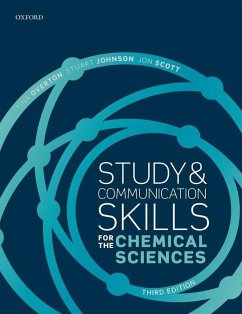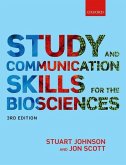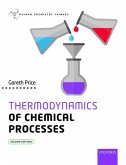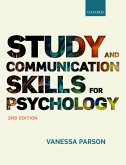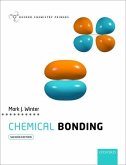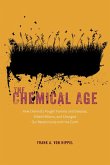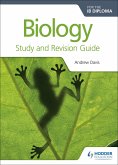Tina Overton (Monash University Professor of Chemical Education), Stuart Johnson (University of Bristol Director of Careers Service), Jon Scott (Pro-Vice-Chancellor, Student Experience, University of L
Study and Communication Skills for the Chemical Sciences
Tina Overton (Monash University Professor of Chemical Education), Stuart Johnson (University of Bristol Director of Careers Service), Jon Scott (Pro-Vice-Chancellor, Student Experience, University of L
Study and Communication Skills for the Chemical Sciences
- Broschiertes Buch
- Merkliste
- Auf die Merkliste
- Bewerten Bewerten
- Teilen
- Produkt teilen
- Produkterinnerung
- Produkterinnerung
Essential reading for all undergraduate chemistry students, this engaging text has been carefully designed to help students successfully make the challenging transition from school through to university, get the most out of their education, and ultimately use their time at university to enhance their employability.
Andere Kunden interessierten sich auch für
![Study and Communication Skills for the Biosciences Study and Communication Skills for the Biosciences]() Stuart Johnson (Director of Careers Se Director of Careers ServiceStudy and Communication Skills for the Biosciences53,99 €
Stuart Johnson (Director of Careers Se Director of Careers ServiceStudy and Communication Skills for the Biosciences53,99 €![Thermodynamics of Chemical Processes Thermodynamics of Chemical Processes]() Gareth Price (Professor, Professor, Physical Chemistry, UniversityThermodynamics of Chemical Processes49,99 €
Gareth Price (Professor, Professor, Physical Chemistry, UniversityThermodynamics of Chemical Processes49,99 €![Study and Communication Skills for the Biosciences Study and Communication Skills for the Biosciences]() Stuart Johnson (Director of Careers and Director of Careers SkillsStudy and Communication Skills for the Biosciences31,99 €
Stuart Johnson (Director of Careers and Director of Careers SkillsStudy and Communication Skills for the Biosciences31,99 €![Study and Communication Skills for Psychology Study and Communication Skills for Psychology]() Vanessa Parson (Senior Lecturer, Senior Lecturer, University of SunStudy and Communication Skills for Psychology29,99 €
Vanessa Parson (Senior Lecturer, Senior Lecturer, University of SunStudy and Communication Skills for Psychology29,99 €![Chemical Bonding Chemical Bonding]() Mark J. Winter (Professor of Chemistry, Professor of Chemistry, TheChemical Bonding49,99 €
Mark J. Winter (Professor of Chemistry, Professor of Chemistry, TheChemical Bonding49,99 €![The Chemical Age The Chemical Age]() Frank A Von HippelThe Chemical Age31,99 €
Frank A Von HippelThe Chemical Age31,99 €![Biology for the IB Diploma Study and Revision Guide Biology for the IB Diploma Study and Revision Guide]() Andrew DavisBiology for the IB Diploma Study and Revision Guide31,99 €
Andrew DavisBiology for the IB Diploma Study and Revision Guide31,99 €-
-
-
Essential reading for all undergraduate chemistry students, this engaging text has been carefully designed to help students successfully make the challenging transition from school through to university, get the most out of their education, and ultimately use their time at university to enhance their employability.
Hinweis: Dieser Artikel kann nur an eine deutsche Lieferadresse ausgeliefert werden.
Hinweis: Dieser Artikel kann nur an eine deutsche Lieferadresse ausgeliefert werden.
Produktdetails
- Produktdetails
- Verlag: Oxford University Press
- 3 Revised edition
- Seitenzahl: 304
- Erscheinungstermin: 18. April 2019
- Englisch
- Abmessung: 189mm x 244mm x 16mm
- Gewicht: 534g
- ISBN-13: 9780198821816
- ISBN-10: 0198821816
- Artikelnr.: 56385319
- Herstellerkennzeichnung
- Libri GmbH
- Europaallee 1
- 36244 Bad Hersfeld
- gpsr@libri.de
- Verlag: Oxford University Press
- 3 Revised edition
- Seitenzahl: 304
- Erscheinungstermin: 18. April 2019
- Englisch
- Abmessung: 189mm x 244mm x 16mm
- Gewicht: 534g
- ISBN-13: 9780198821816
- ISBN-10: 0198821816
- Artikelnr.: 56385319
- Herstellerkennzeichnung
- Libri GmbH
- Europaallee 1
- 36244 Bad Hersfeld
- gpsr@libri.de
Tina Overton is Professor of Chemistry Education at Monash University in Australia and Honorary Professor at the University of Nottingham, UK. Tina has published on the topics of critical thinking, context and problem-based learning, the development of problem solving skills, work-based learning and employability and has co-authored several textbooks in inorganic chemistry and skills development. She has been awarded the Royal Society of Chemistry's HE Teaching Award, Tertiary Education Award and Nyholm Prize, the Royal Australian Chemical Institute's Fensham Medal and is a National Teaching Fellow and Senior Fellow of the Higher Education Academy. Stuart Johnson is the Director of the Careers Service at the University of Bristol. He obtained a BSc in Biological Sciences from the University of Leicester, and a Postgraduate Diploma in Learning and Development from Thames Valley University. He was previously the Deputy Director of the Career Development Service at the University of Leicester. Professor Jon Scott is the Pro-Vice-Chancellor for Student Experience and Professor of Bioscience Education at the University of Leicester. He obtained a BSc in Biological Sciences and a PhD in Neurobiology from Durham University. He joined the University of Leicester as a lecturer in physiology since 1987 and went on to become the Director of Biological Studies.
1: Why are study and communication skills important?
2: Making the most of lectures
3: Making the most of tutorials and workshops
4: Making the most of group work
5: Making the most of practical work
6: Working with different information sources
7: Choosing the right writing style
8: Writing assignments
9: Writing practical and project reports
10: Communicating with a non-scientific audience
11: Avoiding plagiarism
12: Using feedback
13: Preparing scientific presentations
14: Delivering scientific presentations
15: Creating academic posters
16: Getting the most out of revision
17: Getting the most out of exams
18: Developing and articulating your skills
19: Career skills
2: Making the most of lectures
3: Making the most of tutorials and workshops
4: Making the most of group work
5: Making the most of practical work
6: Working with different information sources
7: Choosing the right writing style
8: Writing assignments
9: Writing practical and project reports
10: Communicating with a non-scientific audience
11: Avoiding plagiarism
12: Using feedback
13: Preparing scientific presentations
14: Delivering scientific presentations
15: Creating academic posters
16: Getting the most out of revision
17: Getting the most out of exams
18: Developing and articulating your skills
19: Career skills
1: Why are study and communication skills important?
2: Making the most of lectures
3: Making the most of tutorials and workshops
4: Making the most of group work
5: Making the most of practical work
6: Working with different information sources
7: Choosing the right writing style
8: Writing assignments
9: Writing practical and project reports
10: Communicating with a non-scientific audience
11: Avoiding plagiarism
12: Using feedback
13: Preparing scientific presentations
14: Delivering scientific presentations
15: Creating academic posters
16: Getting the most out of revision
17: Getting the most out of exams
18: Developing and articulating your skills
19: Career skills
2: Making the most of lectures
3: Making the most of tutorials and workshops
4: Making the most of group work
5: Making the most of practical work
6: Working with different information sources
7: Choosing the right writing style
8: Writing assignments
9: Writing practical and project reports
10: Communicating with a non-scientific audience
11: Avoiding plagiarism
12: Using feedback
13: Preparing scientific presentations
14: Delivering scientific presentations
15: Creating academic posters
16: Getting the most out of revision
17: Getting the most out of exams
18: Developing and articulating your skills
19: Career skills

